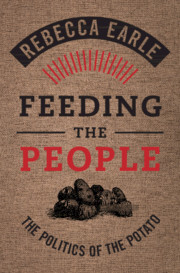Book contents
- Feeding the People
- Feeding the People
- Copyright page
- Dedication
- Contents
- Figures
- Recipes
- Abbreviations
- Introduction Pouring Ourselves a Large Gin
- Chapter 1 Immigrant Potatoes
- Chapter 2 Enlightened Potatoes
- Chapter 3 Free-Market Potatoes
- Chapter 4 Global Potatoes
- Chapter 5 Capitalist Potatoes
- Chapter 6 Security Potatoes
- Conclusions Parmentier, Peasants and Personal Responsibility
- Acknowledgements
- Notes
- Bibliography
- Index
Chapter 6 - Security Potatoes
Published online by Cambridge University Press: 25 June 2020
- Feeding the People
- Feeding the People
- Copyright page
- Dedication
- Contents
- Figures
- Recipes
- Abbreviations
- Introduction Pouring Ourselves a Large Gin
- Chapter 1 Immigrant Potatoes
- Chapter 2 Enlightened Potatoes
- Chapter 3 Free-Market Potatoes
- Chapter 4 Global Potatoes
- Chapter 5 Capitalist Potatoes
- Chapter 6 Security Potatoes
- Conclusions Parmentier, Peasants and Personal Responsibility
- Acknowledgements
- Notes
- Bibliography
- Index
Summary
From 1900 the potato began to regain its lustre as a political instrument. Developments within nutritional science led dieticians to reverse their earlier condemnations. This reversal coincided with an increase in the capacity of modern states to influence everyday eating habits. The First and Second World Wars were particularly important in developing the technologies and institutions that made this possible. Concerned to provide for the wartime needs of their populations, European governments actively encouraged potato consumption. Nonetheless, the economic development models that emerged in the post-war years paid little attention to potatoes. Only recently has smallholder agriculture been incorporated into international models of food security. Just as the peasant know-how that spread potato cultivation across early modern Europe remained largely invisible, so the smallholder expertise that allowed the potato to preserve its genetic diversity has only begun to be appreciated by international development organisations. Potatoes have also become a source of gastronomic pride; many countries have registered specific varieties as part of their national patrimony. The contemporary history of the potato recapitulates both the eighteenth-century conviction that potatoes could play a role in national security, and also the reality that small farmers, as well as agronomists, possess expertise relevant to building a viable food system.
Keywords
- Type
- Chapter
- Information
- Feeding the PeopleThe Politics of the Potato, pp. 168 - 201Publisher: Cambridge University PressPrint publication year: 2020



